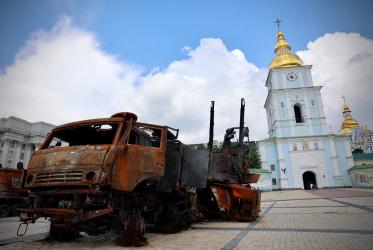The Taizé religious community from the east of France is meeting over the New Year’s period in Riga, Latvia and world church leaders from many traditions have bestowed greetings of hope on its annual gathering.
Each year Taizé draws young people together, often to its base in France, with the brothers there to share prayer and Bible study and encounter in a setting welcoming all Christian traditions.
The European Meeting of Young Adults is being held in Riga from 28 December 2016 to 1 January 2017 and will be a new step in the “pilgrimage of trust on earth” which Taizé founder brother Roger began in the 1970s.
First Taizé European Meeting in a Baltic State
It is the first Taizé European Meeting in a Baltic State, where Taizé says the city of Riga has a long Lutheran tradition, but is also a country with deep connections between Christians of different churches.
“The leaders of the Roman Catholic Church, the Orthodox Church, the Lutheran and the Baptist churches have all signed a common letter inviting Taizé to hold the European Meeting in their city,” said Taizé.
World Council of Churches general secretary, Rev. Dr Olav Fykse Tveit, said in his message, “You have chosen to reflect this year on a very important theme that is at the heart of our faith as Christians communities.”
“Hope. Indeed, hope is a quality of faith. And a necessary condition for hope is that it expresses itself in love for others, whoever and wherever they are.”
"This dimension of hope, that transformation is possible, is a significant dimension of faith in God and faith in the inspiration and strength given by God."
Tveit added "There is a shared confidence in the potential of human beings to understand and pursue the will of God, not only short-sighted and narrow-minded self-interests and perspectives. It is expressed in prayers that are the catalyst for change, a spirituality that has a formative purpose and effect."
Taizé said that among those sending messages this year including Tveit, were: Pope Francis; His All Holiness the Ecumenical Patriarch Bartholomew I, Archbishop of Constantinople; the Moscow Patriarchate; the Archbishop of Canterbury, Justin Welby; the general secretary of the Lutheran World Federation, Rev. Dr Martin Junge; the executive director of the World Evangelical Alliance theological commission, Dr Rosalee Velloso Ewell; the Secretary General of the United Nations Ban Ki-moon; the European Council president, Donald Tusk; and the President of Latvia M. Raimonds Vējonis.
Pope Francis sent a message saying, “Young Orthodox, Protestant and Catholic Christians, by these days lived in real fraternity you manifest your desire to be protagonists of history and not let others decide your future.
“The Pope encourages you to stand firm in hope by letting the Lord live in your hearts and your daily lives. With Jesus, the faithful friend who never disappoints, you will be able to walk along the path toward the future with joy and devote your talents and abilities for the good of all.”
‘A reminder to Europe’
Ecumenical Patriarch Bartholomew said, “You meet again at the crossroads of two years as if to remind Europe that there is an energy in the Christian youth of this continent which does not intend to submit to the isolationist and nationalistic temptations nourished by the fear of terrorism and more generally by the fear of the other.”
He noted 2016 “was a particularly bloody and uncertain year for Europe.”
“However, the challenges ahead in 2017 will be decisive in laying down the guidelines for the European future we hope for,” said Bartholomew.
“The impression of an environment shaken in its certainties of peace, equality and freedom is accentuated by the powerful polarization of public debates, notably on the reception of immigrants, the protection of the creation and a financial crisis which is not finished for everyone.”
European Council president Tusk in his message observed that in a few weeks Europe celebrates the 60th anniversary of the signing of the treaty of Rome, “which opened a pathway of understanding, hope and love.”
“The best way to honour this visionary step is not to look backward and inward, but to struggle harder to look outward and forward to a better, common future,” said Tusk, the former prime minister of Poland.
‘A source of renewal’
Archbishop Justin Welby noted that this year’s meeting was on the theme “‘Together Opening Paths for Hope.’”
He said it “is so very important for the Church. I pray that you would be drawn more and more deeply into the unity of the Spirit in the bond of peace, and that the insights and the energy that come from your time together in Riga may become a source for renewal in our churches here in Europe.”
The LWF’s Martin Junge said, “There seems to be something in the air today, a dangerous mixture of uncertainty, instability, fear and hopelessness, that has resulted in communities, if not the human family, finding it hard to come together and to work together.
“There is a lot of fragmentation that divides communities. Trust seems to be eroding. Again, we seem to be living in times when people seek protection by separating from the other, instead of relating to each other.
“Yet, history shows that there is no wall that prevails and delivers on its false promise to safeguard protection. It is by relating to each other that peaceful neighbourhood is made possible.”







